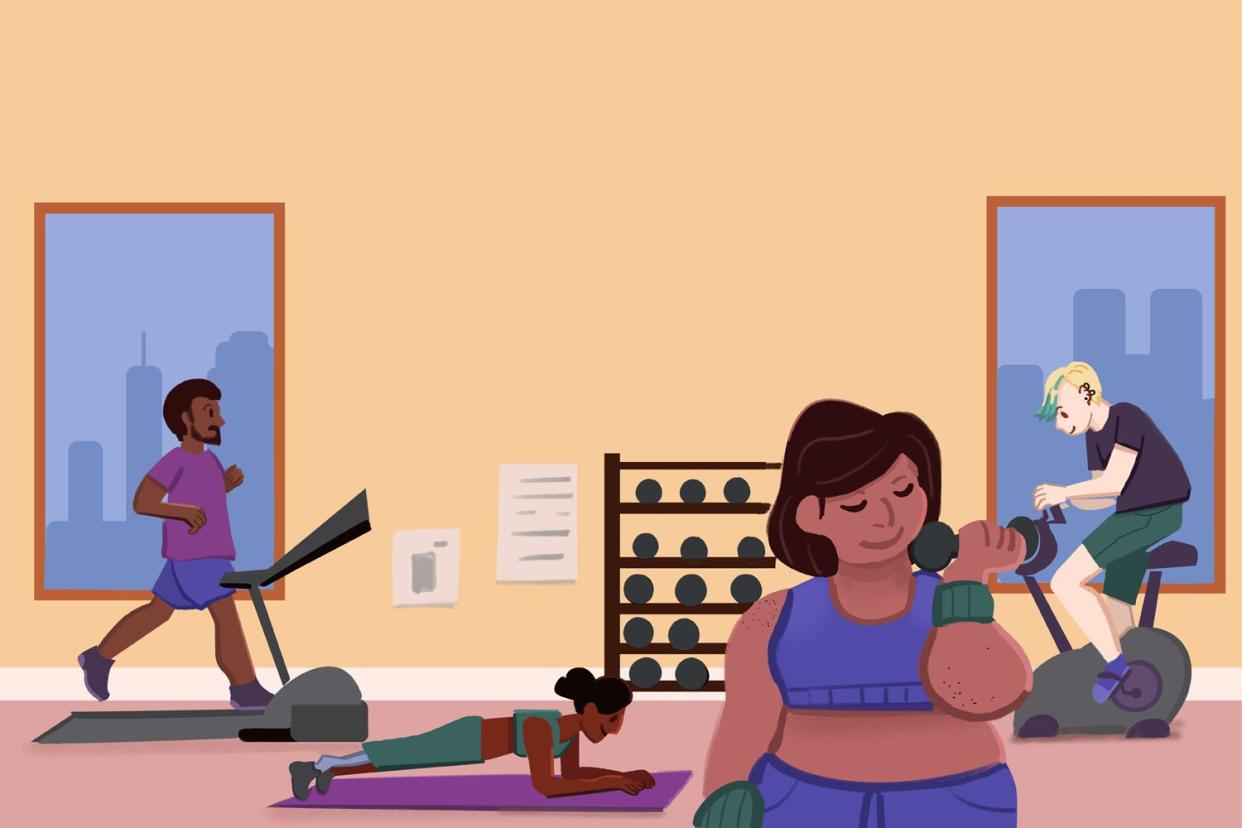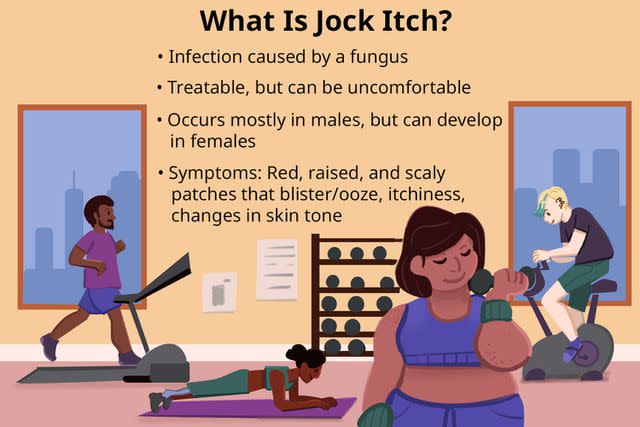Is Jock Itch Contagious?

Verywell / Sydney Saporito
Medically reviewed by Leah Ansell, MD
Jock itch is a contagious fungal infection that can be passed from one person to another by direct skin-to-skin contact or contact with unwashed clothing.
Also called tinea cruris or ringworm of the groin, jock itch remains contagious for as long as you have the infection on your skin, which is typically for a few weeks.
This article discusses how jock itch spreads, how long it lasts, and how you can treat it.

Verywell / Sydney Saporito
What Is Jock Itch?
Jock itch is an infection caused by a fungus in the tinea group, which is a classification for mold-like fungi. Although the condition is harmless and very treatable, it can have some uncomfortable symptoms, including:
Red and raised scaly patches of skin that can blister and ooze
Itchiness
Changes in skin tone that can cause the skin to become darker or lighter, which can be permanent
Jock itch usually stays around the creases of the upper thighs, and does not involve the scrotum or penis. Those experiencing jock itch may also have athlete’s foot, another infection caused by the ringworm fungus.
Some things can trigger jock itch or make someone more susceptible to developing it, including:
Friction from clothes and prolonged moistness in the groin area, which often happens if someone doesn’t change out of sweaty clothes promptly or dry off properly following a bath, shower, or swimming session
A family history of jock itch
Close contact with people who have the infection
You can get jock itch from soft surfaces, such as bedding and towels, as well as hard surfaces, such as exercise equipment or shower floors.
Can Females Get Jock Itch?
Jock itch occurs mostly in males, but females can still develop jock itch. For example, a male can pass the infection to a female through intercourse. Females can also develop jock itch if they come into contact with contaminated clothing. If a female has athlete's foot, the infection can also spread to the groin area through touching or contact with clothing that touched their feet.
Yes. Because the infection is spread from skin-to-skin contact, you are at risk of developing jock itch if you have sexual intercourse with someone who has it.
How Does Jock Itch Spread?
Jock itch spreads easily from person to person, and from one body part to another.
You can get it through direct contact with an infected body part or by coming in contact with an infected surface, such as a pool deck or locker room floor. If you touch it with your hands you can pass it to another part of your body.
You can also get jock itch from an infected towel, article of clothing, or other item. In some cases, the spores of the fungus causing the infection can live on bedding, towels, or other soft surfaces for up to a year if they are not washed properly. Because of this, jock itch can be spread for quite some time even after you have treated the infection.
Related:An Overview of Genital Rashes
Slowing the Spread
To avoid spreading jock itch, you can:
Avoid sharing clothes, jockstraps, or towels with others.
Refrain from any sexual activity until the infection has fully healed.
Steer clear of public showers, restrooms, or swimming pools until you recover.
Thoroughly wipe down exercise equipment at shared gyms before and after use.
It’s possible for children to spread jock itch to one another through sharing clothes and hanging out together in common areas, such as locker rooms at school.
How Long Is Jock Itch Contagious?
Jock itch is contagious for as long as the infection lives on your skin. Jock itch can be contagious even during treatment, so it’s important to avoid letting others touch your clothes during this time.
Symptoms of jock itch go away in a few weeks with treatment. However, if it isn’t treated promptly, the infection can last for weeks or even months. In some cases, using the wrong treatment or participating in activities that worsen the infection can lead to more severe or long-lasting symptoms.
The things that can make jock itch worse include:
Exercise: Typically, exercising causes sweat to build up in the groin area, which can lead to chafing between normal skin and the skin that is affected by jock itch. This can lead to further irritation.
Poor hygiene: Having moist skin for prolonged periods of time, such as staying in damp clothes for too long or sharing dirty clothes or towels with others, can worsen or prolong jock itch.
Lack of treatment: Symptoms of jock itch can persist for a long time if your infection is not treated promptly.
A weak immune system: Certain medications for those with autoimmune disorders weaken the immune system. The same is true for some conditions such as HIV. For those with jock itch, taking immunosuppressive medications or having a condition that causes a weakened immune system can make it more difficult for the body to rid itself of jock itch.
You don’t have to give up exercise altogether if you have jock itch. However, to make sure the condition doesn’t get worse, you should shower immediately after working out, dry off completely with a clean towel, and wear clean, loosely fitted clothing afterward.
How Is Jock Itch Treated?
The first-line treatment for jock itch is an antifungal cream. These can be purchased over-the-counter, but sometimes a prescription-strength cream may be required.
In some cases, an oral antifungal medication and antifungal creams are both needed. Antifungal treatment typically lasts two to four weeks.
Other possible remedies for jock itch include:
Treating other fungal infections on the body, such as athlete’s foot
Keeping the area clean and dry
Changing clothing, especially undergarments and socks, every day or more than once a day if they become wet or damp
Showering or bathing daily, and then drying off with a clean towel
Related:The Best Athlete's Foot Treatments of 2023
Summary
Jock itch is a contagious fungal infection that affects the upper thighs, genitals, and buttocks. It causes a red, itchy, ring-shaped rash. The fungus that causes the infection thrives on warm and moist skin covered by tight-fitting clothing. To avoid spreading the infection, don't share clothing that has come in contact with the infection with others and be sure to treat other fungal infections you may have, such as athlete's foot.
